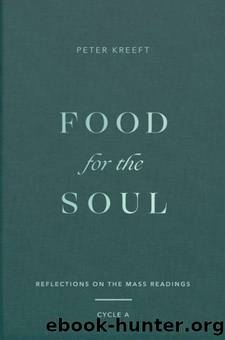Food for the Soul: Reflections on the Mass Readings (Cycle A) by Peter Kreeft

Author:Peter Kreeft [Kreeft, Peter]
Language: eng
Format: epub
Tags: Religion, Christianity, Catholicism, Homilies
ISBN: 9781943243976
Google: v9WczgEACAAJ
Barnesnoble:
Publisher: Word on Fire
Published: 2022-10-24T05:00:00+00:00
What is the Spirit? The same word, in many languages, such as Hebrew and Greek, means âspirit,â âsoul,â and âlife.â This can be confusing to almost all of us, so we need to try to sort out the overlapping meanings here. Please be patient with a little bit of philosophy, because it will help us to understand the language of the Bible and what St. Paul is saying in todayâs epistle.
What is âlifeâ? If a thing lives, it acts from within. Rocks move only when something outside them pushes them, but living things move on their own, whether they just grow from roots in the same place or whether they move around like animals. Plants, animals, humans, angels, and God all have life, but on five different levels.
Plants, animals, and humans have bodies, and God, angels, and humans are spirits. God is infinite spirit; angels are finite spirits; and humans are incarnate spirits, embodied spirits. Man is the only thing that has both bodily life and spiritual life.
So what does âsoulâ mean? The word translated into English as âsoulâ means, in ancient languages, the life of a body, whether plant, animal, or human.
So now we come to our third term, âspirit.â A âspiritâ means a being with reason and choice, knowledge and will. There are three kinds of spirits: human and angelic and divine. (Ghosts are human spirits that used to have bodies but have lost their bodies by death.) Angels are pure spirits, created and finite. God is pure spirit, uncreated and infinite.
Angels donât have bodies; they assume bodily appearances when they interact with humans. They put these appearances on as we put clothes on.
There is a beautiful paradox about all levels of life: it both unifies and diversifies. The more life there is, the more unity and diversity, and the more unity in diversity.
Thus, in todayâs epistle St. Paul tells us that Godâs Holy Spirit brings together for the common good of the Church all the diverse individuals in the worldâJew and Gentile, slave and freeâby Baptism into this one amazingly diverse yet unified Body of Christ.
The Holy Spirit also gives different supernatural gifts to different people in this single Church, such as miracle-working faith, prophecy, speaking in tongues, special gifts of teaching and preaching, and apostolic authority, all for the common good and common life of the Church.
St. Paul uses a physical analogy for this spiritual principle: just as it is one and the same life, or soul, that gives biological life to all the organs in the same body for the common good of that body, whether the body is a human, an animal, or a plant, so the Holy Spirit gives supernatural life to all the individual human souls in the Church, which is Christâs Mystical Body, and gives different supernatural gifts to different members of the Church as a biological soul gives life to different organs in the biological organism.
In fact, we can expand his analogy everywhere. Even on the lowest level, the nonliving
Download
This site does not store any files on its server. We only index and link to content provided by other sites. Please contact the content providers to delete copyright contents if any and email us, we'll remove relevant links or contents immediately.
The 5 Love Languages: The Secret to Love That Lasts by Gary Chapman(9815)
The Space Between by Michelle L. Teichman(6941)
Assassin’s Fate by Robin Hobb(6216)
Wiseguy by Nicholas Pileggi(5786)
Everything Happens for a Reason by Kate Bowler(4743)
Gerald's Game by Stephen King(4654)
Pillow Thoughts by Courtney Peppernell(4284)
A Simplified Life by Emily Ley(4162)
The Power of Positive Thinking by Norman Vincent Peale(4064)
Harry Potter and the Prisoner of Azkaban (Book 3) by J. K. Rowling(3360)
Resisting Happiness by Matthew Kelly(3341)
Girl, Wash Your Face by Rachel Hollis(3282)
Being Aware of Being Aware by Rupert Spira(3276)
The Secret Power of Speaking God's Word by Joyce Meyer(3220)
The Code Book by Simon Singh(3189)
More Language of Letting Go: 366 New Daily Meditations by Melody Beattie(3030)
Real Sex by Lauren F. Winner(3023)
Name Book, The: Over 10,000 Names--Their Meanings, Origins, and Spiritual Significance by Astoria Dorothy(2987)
The Holy Spirit by Billy Graham(2952)
